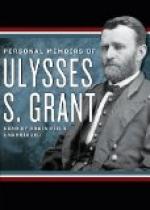I was so very anxious that Burnside should get news of the steps being taken for his relief, and thus induce him to hold out a little longer if it became necessary, that I determined to send a message to him. I therefore sent a member of my staff, Colonel J. H. Wilson, to get into Knoxville if he could report to Burnside the situation fully, and give him all the encouragement possible. Mr. Charles A. Dana was at Chattanooga during the battle, and had been there even before I assumed command. Mr. Dana volunteered to accompany Colonel Wilson, and did accompany him. I put the information of what was being done for the relief of Knoxville into writing, and directed that in some way or other it must be secretly managed so as to have a copy of this fall into the hands of General Longstreet. They made the trip safely; General Longstreet did learn of Sherman’s coming in advance of his reaching there, and Burnside was prepared to hold out even for a longer time if it had been necessary.
Burnside had stretched a boom across the Holston River to catch scows and flats as they floated down. On these, by previous arrangements with the loyal people of East Tennessee, were placed flour and corn, with forage and provisions generally, and were thus secured for the use of the Union troops. They also drove cattle into Knoxville by the east side, which was not covered by the enemy; so that when relief arrived Burnside had more provisions on hand than when he had last reported.
Our total loss (not including Burnside’s) in all these engagements amounted to 757 killed, 4,529 wounded and 330 missing. We captured 6,142 prisoners—about 50 per cent. more than the enemy reported for their total loss—40 pieces of artillery, 69 artillery carriages and caissons and over 7,000 stands of small-arms. The enemy’s loss in arms was probably much greater than here reported, because we picked up a great many that were found abandoned.
I had at Chattanooga, in round numbers, about 60,000 men. Bragg had about half this number, but his position was supposed to be impregnable. It was his own fault that he did not have more men present. He had sent Longstreet away with his corps swelled by reinforcements up to over twenty thousand men, thus reducing his own force more than one-third and depriving himself of the presence of the ablest general of his command. He did this, too, after our troops had opened a line of communication by way of Brown’s and Kelly’s ferries with Bridgeport, thus securing full rations and supplies of every kind; and also when he knew reinforcements were coming to me. Knoxville was of no earthly use to him while Chattanooga was in our hands. If he should capture Chattanooga, Knoxville with its garrison would have fallen into his hands without a struggle. I have never been able to see the wisdom of this move.




